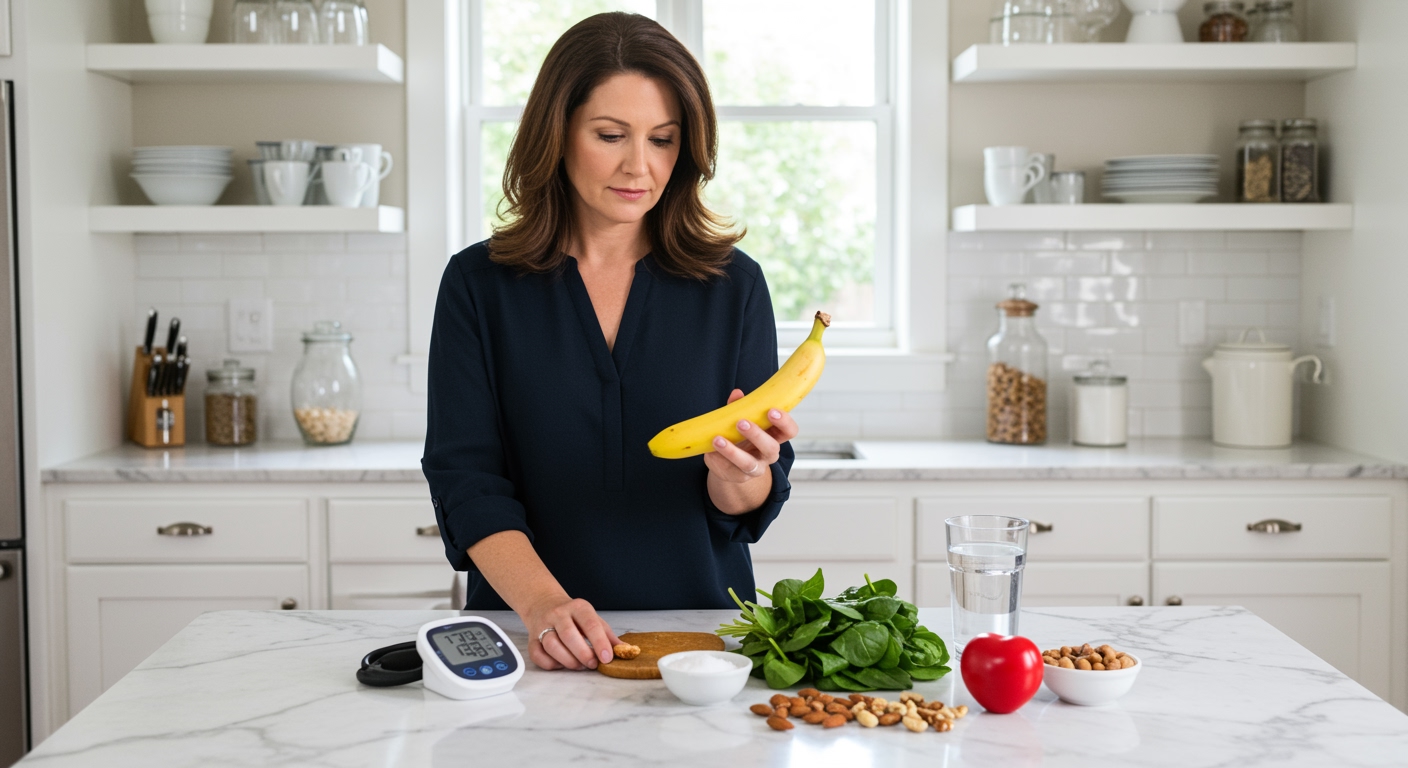✪ Key Takeaway: Bananas can help raise low blood pressure naturally through their high potassium content and blood vessel support.
Introduction
Your doctor just told you that your blood pressure is too low and you need to make some changes.
You might be wondering if that banana sitting on your kitchen counter could actually help solve this problem instead of making it worse.
Hi, I am Abdur, your nutrition coach and today I am going to explain exactly how bananas affect low blood pressure and whether they should be part of your daily routine.
What Happens When Your Blood Pressure Drops Too Low?
Low blood pressure, also called hypotension, occurs when your blood pressure reading falls below 90/60 mmHg.
Your heart pumps blood through your arteries with less force than normal.
This means your organs and tissues receive less oxygen and nutrients than they need to function properly.
Common symptoms include dizziness, fatigue, nausea, and even fainting spells that can interfere with your daily activities.
Your kidneys play a crucial role in blood pressure regulation by controlling fluid balance and sodium levels in your body.
When blood pressure drops, your kidneys release hormones that help retain sodium and water to increase blood volume and pressure.
✪ Fact: Normal blood pressure ranges from 90/60 to 120/80 mmHg for most healthy adults.
How Do Bananas Actually Affect Your Blood Pressure?
One medium banana contains approximately 422 milligrams of potassium, which is about 12 percent of your daily recommended intake.
Potassium works as a natural vasodilator, meaning it helps relax the smooth muscles in your blood vessel walls.
When your blood vessels relax, they become wider and allow blood to flow more easily through your circulatory system.
This process can help normalize blood pressure by reducing the resistance your heart faces when pumping blood.
Bananas also contain natural sugars that provide quick energy and help maintain stable blood sugar levels throughout the day.
The fiber in bananas slows down sugar absorption, preventing rapid spikes and crashes that can affect your cardiovascular system.
✪ Pro Tip: Eat bananas with a small amount of healthy fat like almond butter to slow sugar absorption even more.
Can Bananas Really Help Raise Low Blood Pressure?
Research shows that adequate potassium intake helps maintain healthy blood pressure levels in people with both high and low blood pressure.
For people with hypotension, the potassium in bananas supports proper fluid balance and helps your kidneys regulate blood volume more effectively.
The natural sugars in bananas can provide a gentle boost to your blood volume and help prevent the sudden drops that cause dizziness.
Bananas also contain vitamin B6, which helps your body produce red blood cells and supports healthy circulation.
The magnesium in bananas works alongside potassium to support proper muscle function, including your heart muscle.
However, bananas alone cannot cure severe hypotension that requires medical intervention and prescription medications.
✪ Note: Always consult your doctor before using food as medicine for blood pressure management.
What Is The Best Way To Eat Bananas For Low Blood Pressure?
Timing matters when you eat bananas for blood pressure support throughout your day.
Eat one medium banana in the morning with breakfast to help stabilize your blood pressure as you start your day.
Choose bananas that are yellow with brown spots because they contain more easily digestible sugars and higher antioxidant levels.
Pair your banana with a source of healthy protein like Greek yogurt or a handful of nuts to create more sustained energy.
Avoid eating bananas on an empty stomach if you experience blood sugar swings that might affect your blood pressure.
Consider adding banana slices to oatmeal or whole grain cereal to combine the benefits with other heart-healthy nutrients.
✪ Pro Tip: Freeze overripe bananas and blend them into smoothies for a natural blood pressure supporting treat.
Are There Any Risks Of Eating Bananas With Low Blood Pressure?
Most people can safely eat one to two bananas daily without experiencing negative effects on their blood pressure.
However, people taking certain blood pressure medications should monitor their potassium intake carefully to avoid dangerous interactions.
ACE inhibitors and potassium-sparing diuretics can cause potassium levels to build up too high when combined with high-potassium foods.
Diabetics should be aware that bananas contain natural sugars that can affect blood glucose levels and indirectly impact blood pressure.
People with kidney disease may need to limit potassium intake because their kidneys cannot process excess amounts effectively.
Always check with your healthcare provider before making significant dietary changes if you have any underlying health conditions.
✪ Note: Track your blood pressure readings when adding bananas to see how your body responds individually.
The Bottom Line
Bananas can be a helpful addition to your diet if you struggle with low blood pressure because they provide potassium, natural sugars, and other nutrients that support cardiovascular health.
Good nutrition is not about single foods solving complex problems, but about creating sustainable patterns that support your body over time.
I would love to hear about your experience with bananas and blood pressure management, so please share your questions or thoughts in the comments below.
References
At NutritionCrown, we use quality and credible sources to ensure our content is accurate and trustworthy. Below are the sources referenced in creating this article:
- Consensus: Bananas Effect on Blood Pressure
- Prevention: Do Bananas Lower Blood Pressure
- American Heart Association: How Potassium Can Help Control High Blood Pressure
- Cleveland Clinic: Benefits of Bananas





